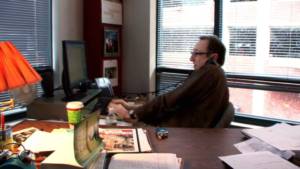Columbus Jewish Film Festival | Celebration Offers Reel Diversity
Columbus Dispatch
Columbus Jewish Film Festival As he sat in a synagogue listening to sexual-abuse survivors pour out their hearts, Phil Jacobs was moved. As an observant Orthodox Jew, he was shocked to hear, in 2006, tales of people being abused by rabbis, friends and camp counselors. As a journalist, he knew he had an important story. As the survivor of a sexual assault by a camp counselor at age 14, his heart went out to the victims. Then came his turn to speak. “I heard myself tell them for 10 minutes what had happened to me,” said Jacobs, 59. “There was one particular guy in the group who got up and said, ‘It doesn’t matter what we say or do here, but nobody’s going to listen to us and nothing’s going to change. It will all be covered up.’ “That lit a fuse inside me because I didn’t want that to be the case.” In 2007, Jacobs, then the executive editor of the Baltimore Jewish Times, began writing about the abuse in a series of articles that polarized the city’s Jewish community. Soon after he began writing about sexual abuse in the Orthodox Jewish community in Baltimore, film producer Scott Rosenfelt ( Home Alone, Mystic Pizza), a friend, began filming a documentary about Jacobs’ findings. Standing Silent (2011) will be screened as part of the eighth annual Columbus Jewish Film Festival, an 11-film event that began on Sunday. Standing Silent is one of three documentaries to be shown on Sunday at the Drexel Theatre, 2254 E. Main St., Bexley. Festival director Emily Schuss said the committee debated whether to show the movie. “I had one co-chair who said, ‘We have to show this,’?” she said. “It happens to be about an Orthdox Jew, he happens to be a reporter, but we’re not bringing the film because he’s Jewish. We’re bringing the film because it’s an issue that needs to be talked about.” After that 2006 meeting at the synagogue, one man approached Jacobs and asked to tell his story. Jacobs interviewed the man but, as an abuse survivor, couldn’t bring himself to write the story. However, the man kept prodding Jacobs, who re-interviewed the man and shared his story of being molested by the teenage son of a rabbi who ran a summer camp. (The teenager was later convicted of having sex with a child.) “When that story came out, I heard largely good things from people in the Orthodox community,” Jacobs said. “They said, ‘It was so great you were bringing this to light.’ A rabbi friend said, ‘I made my children read it.’? ” Then the calls began — people who had been molested by those in positions of power. Jacobs wrote stories and named names. And the backlash began. People stopped him in public to scream at him for disrespecting the dead and for going against the Jewish tradition of lashon hora. “It translates to evil tongue,” Jacobs said. “It’s gossip. That, in Judaism, is one of the most horrible things you can do — it’s to embarrass another person. “At that point, the rabbis were asking me not to run any more stories.” Jacobs continued to write — including accusations against the rabbi who officiated at his wedding. At the Drexel screening, Jacobs — now the editor-in-chief of Washington Jewish Week and still writing about sexual molestation — will answer questions from the audience. While talking with people who see Standing Silent, he has learned that the problem is widespread. “This is not an Orthodox thing; this is across the board in Judaism,” he said. “It has almost never failed where I’ve been approached by one person who had a look on their face that they’ve been hurt, been damaged. And in the venue I’m speaking, I hope there’s a therapist who can take care of them. “I try to offer hope that there are a lot of good people who are willing to help. “It’s OK if it’s taken you 30 years to come out and talk about this situation. “And, sometimes, that’s all people need to hear.” Contact: tmikesel@dispatch.com
|
.
Any original material on these pages is copyright © BishopAccountability.org 2004. Reproduce freely with attribution.
